- Back to Home »
- Pope's remarkable words on gays
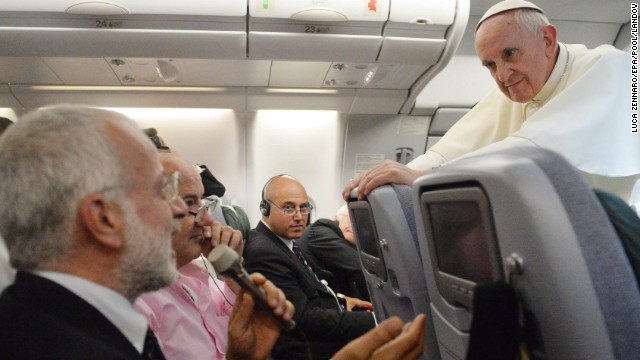 Pope Francis makes some unexpected comments on issues facing the Roman Catholic Church on Monday, July 29. He spoke on the record to journalists on a flight back back to Italy from Brazil after finishing his first international trip as pontiff. Among the topics he addressed were homosexuality, the church's alleged "gay lobby," the role of women, abortion, divorce and the Vatican Bank.
Pope Francis makes some unexpected comments on issues facing the Roman Catholic Church on Monday, July 29. He spoke on the record to journalists on a flight back back to Italy from Brazil after finishing his first international trip as pontiff. Among the topics he addressed were homosexuality, the church's alleged "gay lobby," the role of women, abortion, divorce and the Vatican Bank. 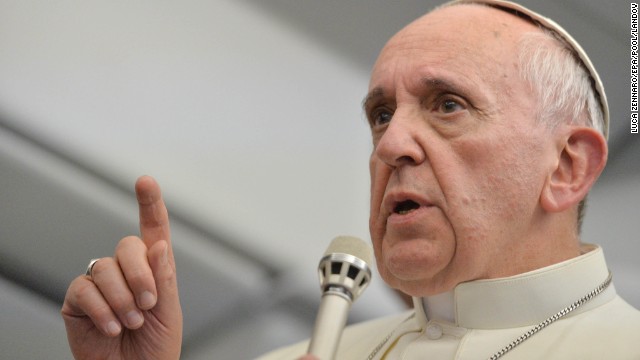 On the flight, Francis said he will not "judge" gay priests, a huge shift from his predecessor, Pope Emeritus Benedict XVI, who sought to bar men with "homosexual tendencies." "If someone is gay and he searches for the Lord and has good will, who am I to judge?" Francis said.
On the flight, Francis said he will not "judge" gay priests, a huge shift from his predecessor, Pope Emeritus Benedict XVI, who sought to bar men with "homosexual tendencies." "If someone is gay and he searches for the Lord and has good will, who am I to judge?" Francis said. 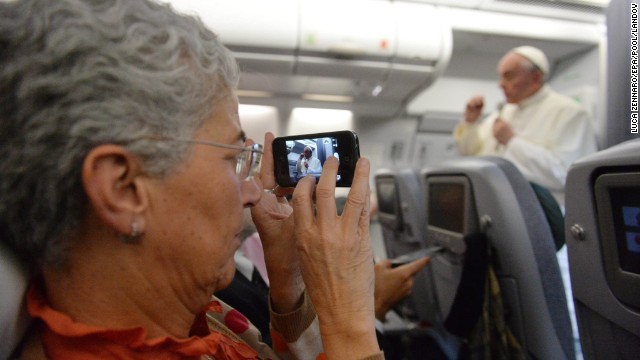 A journalist takes a picture of Pope Francis during the press conference on the flight back to Italy. The pope said the role of women in the church should be deeper, but he brushed aside the possibility of women being ordained as priests. "The church says no. That door is closed."
A journalist takes a picture of Pope Francis during the press conference on the flight back to Italy. The pope said the role of women in the church should be deeper, but he brushed aside the possibility of women being ordained as priests. "The church says no. That door is closed." 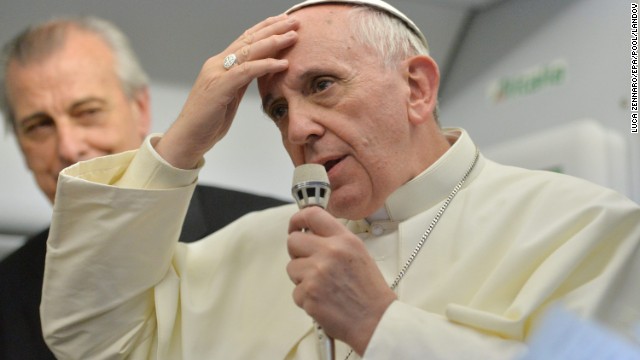 Francis said he had nothing to say about abortion while in Brazil because church teachings against it were clear and his trip was the time for "positive" news.
Francis said he had nothing to say about abortion while in Brazil because church teachings against it were clear and his trip was the time for "positive" news. 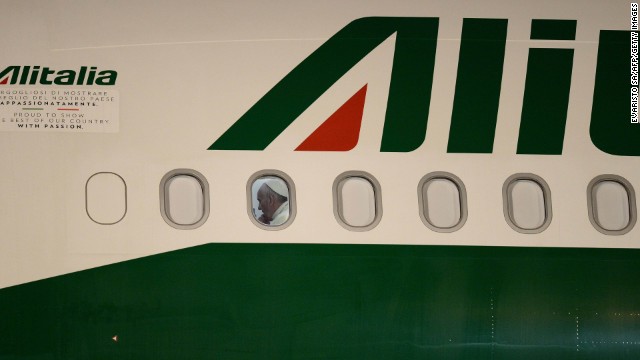 Pope Francis sits inside the plane at a Rio de Janeiro air base Sunday, July 28, before departing for Rome. On the trip back, the pope said cardinals were exploring the question of whether divorced people can receive communion, which they are currently banned from doing. He also said he was unsure what to do with the Vatican Bank, which has faced corruption allegations recently.
Pope Francis sits inside the plane at a Rio de Janeiro air base Sunday, July 28, before departing for Rome. On the trip back, the pope said cardinals were exploring the question of whether divorced people can receive communion, which they are currently banned from doing. He also said he was unsure what to do with the Vatican Bank, which has faced corruption allegations recently. - Kevin Clarke: Pope Francis' remarks about gays aren't a new position on homosexuality
- Clarke: His talking frankly was startling, but calling for compassion for gays is not new
- Clarke: The church may change its tone and approach to gay and lesbian Catholics, however
- But pope's call in Rio for action on social injustice and poverty was equally important, he says
Editor's note: Kevin Clarke is senior editor/chief correspondent at America magazine, a national news and culture weekly published by the Jesuits.
(CNN) -- Pope Francis ignited a firestorm on the Internet with a few words about gay and lesbian people that seemed to suggest a new church position on homosexuality. I say "seemed to" because it would only appear new to someone who was unfamiliar with the old position.
Speaking to a gang of reporters bringing up the rear of his plane on the way home from his quotific visit to Rio de Janeiro, the pope was asked about his recent reference to a "gay lobby" among the curial staff in Rome. That phrase is already the source of some confusion.
The pope responded that although a "gay lobby," as in an inter-curial pressure group -- for or against more acceptance of gay Catholics, who can say? -- might be an issue, he did not have a problem with men and women who are homosexual. "If they accept the Lord and have good will, who am I to judge them? They shouldn't be marginalized. The tendency (to homosexuality) is not the problem ... they're our brothers."
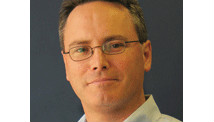
Speaking about homosexuality so frankly was remarkable in and of itself, but nothing the pope said deviated from current Catholic catechism. Although it regards homosexual acts as "intrinsically disordered," church teaching demands that gay and lesbian people be accepted with "respect, compassion, and sensitivity."
"Every sign of unjust discrimination in their regard should be avoided," reads the catechism. "These persons are called to fulfill God's will in their lives and, if they are Christians, to unite to the sacrifice of the Lord's Cross the difficulties they may encounter from their condition."
The catechism is a little more nuanced, and less unsightly, than the standard "hate the sin, love the sinner" platitude, but it doesn't say much more and it's far less than most lesbian, gay, bisexual and transgender Catholics would like to hear from their church. Pope Francis was merely reiterating this teaching in his wonderfully straightforward, cut-through-the-gobbledygook manner.
That's not to say that his remarks don't suggest a different emphasis in the church's tone and pastoral approach to gay and lesbian Catholics that will surely be welcome. Francis places the emphasis first on solidarity ("they're our brothers") and refers to the redemption and mercy all of us require and are capable of achieving. And as a practical ecclesiastical matter, his comments also argue that the "duty" to discourage the vocations of men with "deep-seated homosexual tendencies" may be en route to the "don't ask, don't tell" historical rag and bone shop.
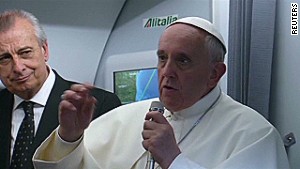 Pope: 'Who am I to judge' gay clergy
Pope: 'Who am I to judge' gay clergy 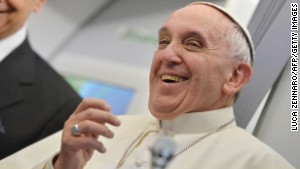 Pope welcomes gay community to church
Pope welcomes gay community to church 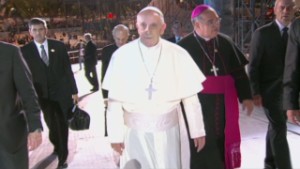 What we learned about Pope Francis
What we learned about Pope Francis 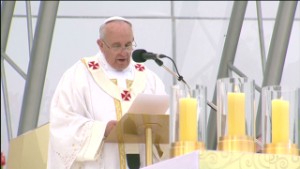 Pope concludes trip to Brazil
Pope concludes trip to Brazil Other groups of disaffected Catholics can also take heart from the pope's unfiltered comments on the plane. He suggested that his cardinal action squad of curial reformers will also be looking at the way the church has treated Catholics who, for whatever reason, could not annul their marriages. Divorced and remarried Catholics have long been cut off from the sacramental and communal life of the church. Francis clearly wants to find a way to bring them home.
Women can also be hopeful that Francis hears their lamentations regarding how they have been cut off from leadership roles in the church. Although he suggested that he had little inclination to return to the issue of women's ordination, he said the church still has far to go in developing a real theology that explains the importance of women in the church. What that means practically speaking remains to be seen.
Let's hope that what does not become lost as his comments on homosexuality are parsed, turned over and otherwise manhandled by the media in the coming days, is the pope's keen attention during his World Youth Day visit to issues of economic injustice and the importance of political and social dialogue. Asked why he did not spend so much time on issues such as abortion and same-sex marriage while in Rio, he said the church's teaching on such matters are already clear.
This pope may be interested in moving at least rhetorically away from cultural stalemates and on to other issues that have also long been a preoccupation of the church: fighting poverty and human deprivation, creating political and economic opportunity, the just and sustainable stewardship of creation.
In Rio he spoke frequently on social justice and alleviating poverty, asking all to give of their talents to respond to the world's aching needs in a country where those needs and inequities are obvious. In Rio, Francis expressed his hope for a "culture of encounter," as he described it. That's an encounter across gay and straight lines, political and class lines, self-drawn lines between secularists and the faithful, borders between the haves and have-nots. As important as his off-the-cuff comments on the plane were -- and might turn out to be in the future -- his message of solidarity and his call to action on social injustice and economic inequality had a just claim to its share of the bandwidth on Twitter this week.
Follow us on Twitter @CNNOpinion.
Join us on Facebook/CNNOpinion.
The opinions expressed in this commentary are solely those of Kevin Clarke.







